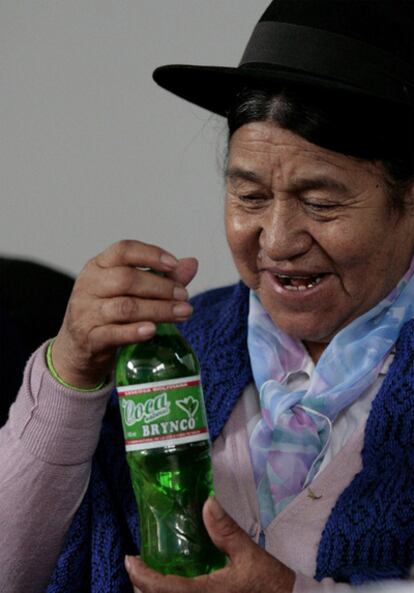¡°It¡¯s satanized by the Spaniards - they think it's cocaine!¡±
How the misunderstood coca leaf is sold discreetly in a few Madrid shops
On a sunny morning a woman paces the sidewalk in front of the Bolivian Embassy in Madrid, selling takeaway packs of homemade South American snack foods. She disappears into a doorway for a minute and emerges carrying a small plastic bag that she exchanges, for a five-euro note, with a person who had been waiting for her.
The object of the exchange is a bag of leaves of the coca plant, a product prohibited by the UN, illegal in Spain, inoffensive according to scientific studies, yet catalogued as a narcotic. Treated with sulfuric acid it becomes cocaine base, a paste that, once "cooked" with other chemicals, produces cocaine hydrochloride, the drug that three out of every hundred Spaniards sniff at least once a year.
Prohibited by the UN and illegal in Spain, coca is inoffensive according to studies
He sets a generous bag on the counter: "100 grams, 18 euros"
The coca leaf in itself is merely a natural stimulant, which is chewed or drunk as an infusion (it helps you tolerate altitude sickness). The leaf contains less than 0.8 percent of the drug. To prepare a kilo of cocaine you need 600-1,000 kilos of leaves, says the government of Colombia, where (along with Peru and Bolivia) it is most commonly grown.
In Madrid the sale of coca leaves is a small-scale business conducted between immigrants from the Andean lands. The police look the other way, and nobody bothers them. The hub of the trade is in the southwestern neighborhood of Usera, where many of the city's Bolivians are concentrated. Asking people in the street, it's hard to find anyone who admits to using coca leaves, but everyone knows where you can buy them.
We enter three small groceries recommended to us in this way. In the first the assistant quietly admits they have the leaves, but then the boss comes along and denies it. In a tone of annoyance she says she has "nothing to do with that," but then relaxes and talks about the variety of things you can make with coca leaves - "chewing gum, candy, cough syrup, shampoo" - and ends in a defense of the coca bush: "It's satanized by the Spaniards - they think it's cocaine!" Bolivians are fond of the leaf, but prefer to avoid problems. They know that dealing on a small scale is tolerated. So they talk about it openly, without beating around the bush, but still discreetly.
The air of caution disappears in another shop in Usera, where the leaves seem to be sold as routinely as bay leaves (which they somewhat resemble). "Hello, have you got coca leaves?" "Yes," a Latino youth answers mechanically. He sets a generous bag on the counter: "100 grams, 18 euros" (on the black market in South America a kilo is worth a euro, according to the Colombian government). The boss, a Spaniard, gives us a bill.
In the third shop, discretion is again the rule. Behind the counter, among bottles of cacha?a in an otherwise scantily stocked shop, sits a Bolivian man. He says he can have the leaves in an hour. When the customer expresses an unwillingness to wait so long, he changes his tune. "Well, just wait here a minute." He goes out back and emerges with a small bag: five euros for 20 grams.
This thin veil under which the leaves are sold in a few Madrid shops is the result of a decision made by the UN in 1961, prohibiting the chewing of coca leaves, and their cultivation. In the traditional coca-growing countries the ban is observed more or less in the breach. Colombia, the most rigorous, allows cultivation and consumption only in indigenous regions. Peru allows retail sale, and a public company controls production. In Bolivia, sale is legal and consumption general, especially among the older generation.
The problem lies in the use that can be made of the leaves. According to Eusebio Mej¨ªas of the NGO Fundac¨ªon de Ayuda contra la Drogadicci¨®n, "the international agencies are afraid of lifting the ban, in case most of the leaf volume started to go into the production of cocaine." The leaf is harmless, he adds, according to a study made by the UN itself - "but it was never published."
In Spain, Bolivians complain the plant lies under the shadow of cocaine. For them it is just a kind of tea, which moreover bears the seal of approval of the indigenous gods. For the Spanish palate, taken as an infusion, the coca leaf has a bitter taste, and benefits greatly from a spoonful of sugar. With four leaves, the 0.8 percent of cocaine has the effect of a cup of coffee.

Tu suscripci¨®n se est¨¢ usando en otro dispositivo
?Quieres a?adir otro usuario a tu suscripci¨®n?
Si contin¨²as leyendo en este dispositivo, no se podr¨¢ leer en el otro.
FlechaTu suscripci¨®n se est¨¢ usando en otro dispositivo y solo puedes acceder a EL PA?S desde un dispositivo a la vez.
Si quieres compartir tu cuenta, cambia tu suscripci¨®n a la modalidad Premium, as¨ª podr¨¢s a?adir otro usuario. Cada uno acceder¨¢ con su propia cuenta de email, lo que os permitir¨¢ personalizar vuestra experiencia en EL PA?S.
En el caso de no saber qui¨¦n est¨¢ usando tu cuenta, te recomendamos cambiar tu contrase?a aqu¨ª.
Si decides continuar compartiendo tu cuenta, este mensaje se mostrar¨¢ en tu dispositivo y en el de la otra persona que est¨¢ usando tu cuenta de forma indefinida, afectando a tu experiencia de lectura. Puedes consultar aqu¨ª los t¨¦rminos y condiciones de la suscripci¨®n digital.








































